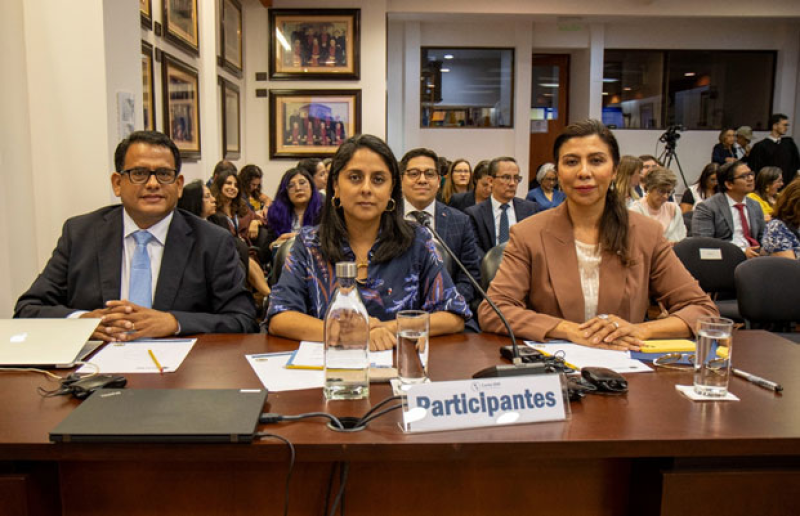- Remittance Inflow Surges 45% to $3.17bn in January |
- Militant Attacks Kill 33 in Balochistan; 92 Assailants Dead |
- Power generation at Payra Thermal Power Plant 1st unit starts after a month |
- Irregularities, injustice will no longer be accepted in politics: Jamaat Ameer |
- 2 arrested in Jhenaidah for allegedly selling madrasa student |
Court Declares Care a Human Right in Historic Americas Ruling

Credit: Corte IDH/Twitter
On 7 August, the Inter-American Court of Human Rights delivered a groundbreaking decision that could transform women’s lives across the Americas. For the first time, an international tribunal recognised care as an autonomous human right. Advisory Opinion 31/25, issued in response to a request from Argentina, elevates care – long invisible and relegated to the private sphere – to a universal and enforceable entitlement.
The decision followed a highly participatory process that included written submissions from civil society, academics, governments, and international organisations, as well as public hearings in Costa Rica in March 2024. The ruling validates what feminist activists have argued for decades: care work is labour with immense social and economic value that deserves recognition and protection.
The statistics behind the ruling highlight stark inequalities. In Latin America, women perform between 69 and 86 per cent of all unpaid domestic and care work, limiting their careers, education, and personal development. The court recognised this imbalance as a form of structural gender inequality requiring urgent state action.
The decision defines care broadly, covering tasks essential for sustaining life – from food and healthcare to emotional support. It establishes three interdependent dimensions: the right to provide care, the right to receive care, and the right to self-care.
The court interpreted the American Convention on Human Rights as encompassing the right to care, making clear that states must respect, protect, and guarantee this right through laws, policies, and resources. Recommended measures include equal paid paternity and maternity leave, workplace flexibility for carers, recognition of care work as labour deserving social protection, and comprehensive public care systems.
The court’s decision reflects decades of feminist scholarship and activism. It affirms that care work is not a “natural” extension of women’s roles but vital labour with economic and social value. The advisory opinion also highlighted the disproportionate burdens faced by Indigenous, Afro-descendant, migrant, and low-income women, recognising the intersection of gender, race, class, and migration in shaping inequality.
Importantly, the ruling linked self-care to access to sexual and reproductive health services, underscoring that wellbeing requires the ability to make free and informed choices about pregnancy, childbirth, and bodily autonomy. It stressed that all people – including women, transgender, and non-binary individuals who can become pregnant – must be free from imposed mandates of motherhood or care.
Civil society played a central role in this victory. Feminist and human rights organisations campaigned to bring the issue before the court and provided crucial expertise. They documented the realities of women caring for incarcerated relatives, migrant women in precarious care jobs, and communities without basic services like water and sanitation – all of which make unpaid care more burdensome.
The opinion’s impact extends beyond gender equality. Recognising care as a universal human need positions it as a cornerstone of sustainable development. Investment in care infrastructure can create jobs, reduce inequality, and boost women’s workforce participation, while ensuring dignity and autonomy for children, older people, and persons with disabilities.
While advisory opinions aren’t legally binding, they set influential standards for constitutional reforms, litigation, and policy development. The ruling provides a blueprint for societies where care is recognised as a shared responsibility rather than an invisible burden.
However, activists warn that the court’s failure to designate the state as the primary guarantor of care rights leaves room for governments to offload responsibilities onto families, perpetuating inequality. The challenge now lies in ensuring that implementation prioritises state accountability.
Civil society and feminist movements are already mobilising to push governments to pass laws, allocate budgets, and build care infrastructure. States are urged to integrate time-use surveys into national accounts, recognise caregiving in workplaces, and engage men and boys in care work.
The Inter-American Court has shown what is possible: societies where care is valued, supported, and shared. For millions of women across the Americas, the work of turning this historic recognition into lived reality begins now.

